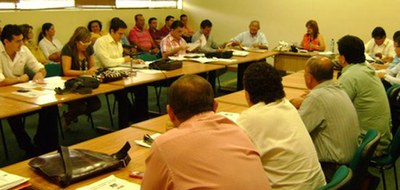Huila: the water factory of Colombia

Under some estimates, Huila will be one of the driest departments in Colombia as a result of climate change. Huila’s economy represents all sectors of the country’s economy, including energy, hydrocarbons, minerals, agriculture (currently the major coffee producer of Colombia), and cattle ranching— all of which will have to become part of the nation’s adaptation and low carbon economy strategies.
FCMC is supporting Huila with the project Huila 2050, which is developing a climate change action plan for the department. Implementing this project for FCMC is E3, headed up by Claudia Martínez Zuleta. The plan intends to integrate climate change adaptation and mitigation in a single approach, with a long term development vision to assure that Huila continues to be competitive and well adapted to future climate conditions. The Huila 2050 project has a technical committee, including experts from national and regional institutions, and international advice from the Stockholm Institute, Abt Associates and CATIE. Huila 2050 is viewed as an example of an innovative climate change project by the rest of the Departments of Colombia. The project is coordinated though the Regional Environmental Corporation, CAM, and is serving as an umbrella project that unifies institutions, projects and sectors of the department, with a common goal of assuring development that is compatible with the future climate.
Recently, two important workshops were held in Colombia to advance the implementation of the Huila 2050: Preparing for Climate Change initiative:
|
The first workshop was an Indicators Workshop held on May 30, 2013 in Bogota. The main objective was to initiate the process to select indicators that will be used in the climate change vulnerability assessment, and for the monitoring and evaluating of actions that will be included in the Action Plan. The workshop provided the opportunity for participants to work in small focus groups to review and prioritize indicators on the key themes of the Climate Change Action Plan; biophysical, political and institutional, social and cultural and sectorial economics. The second workshop was a Stakeholder Mapping Workshop held in Neiva, the capital of the Department of Huila the following day, May 31st. The main objective was to identify relevant stakeholders related to the development and implementation of the Climate Change Action Plan, explore and map power relationships and gauge the relative influence of different stakeholders. Stakeholders represented key institutions and sectors in Huila including CAM, rancher associations, coffee producers associations, the governor’s office, an environmental NGO, local universities, and E3. The outcomes of this workshop will inform the development of a survey tool that will be used to gather additional information on stakeholders implicated in the development and implementation of the Climate Change Action Plan, and their influence and interest in the issue. |
To read a recently published article about FCMC’s contractor Claudia Martínez Zuleta, head of E3, and E3’s work on the Huila project, please click here. To read a condensed report on Huila 2050, please click here.

